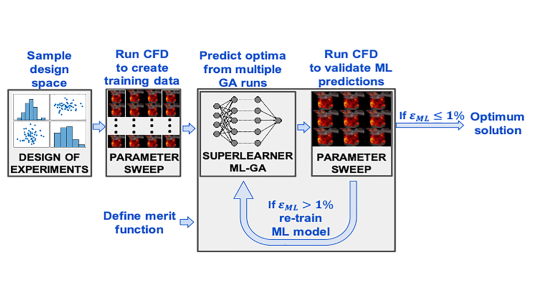
Argonne work that leverages machine learning to speed-up virtual engine design has been selected by U.S. DRIVE (Driving Research for Vehicle efficiency and Energy sustainability) for its latest annual compilation of technical accomplishment highlights. U.S. Drive is a voluntary government-industry partnership focused on precompetitive, advanced automotive and related infrastructure technology research and development.
U.S. DRIVE teams select 60 to 70 highlights from many hundreds of DOE-funded projects conducted by some of the nation’s top research organizations to include in the annual report. Each highlight represents what partnership experts collectively consider to be significant progress in the development of advanced automotive and infrastructure technologies.
The novel optimization technique developed by Argonne researchers, Machine Learning – Genetic Algorithm (ML-GA), overcomes the long simulation runtimes that limit the usefulness of traditional virtual approaches. With the new approach, rigorously validated computational fluid dynamics simulations generate data from which ML-based surrogate models are developed, to predict engine performance as a function of the design parameters. Argonne researchers demonstrated the novel ML-GA approach for engine design, considering various parameters related to piston bowl geometry, fuel injection, and more. ML-GA reduced time-to-design by 80%, from a few months to a few days, compared to traditional methods.
In collaboration with industry partners Parallel Works and Convergent Science, Argonne researchers have now implemented their copyrighted ML-GA software technology in an end-to-end ML workflow. The new workflow, developed under the U.S. Department of Energy Technology Commercialization Fund, can be broadly utilized.